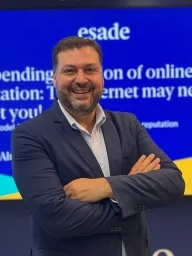Director general of Nestlé Spain: “Resilience, adaptability and ambition are crucial to be competitive today”
“Resilience, adaptability and ambition are crucial in order to be competitive today,” explained Jordi Llach, director general of Nestlé Spain, at the latest Esade Matins session entitled “Empresas competitivas entre oleadas de tornados" (Competitive companies in hostile scenarios) which gave an overview of the company’s history since its creation in 1867 by Henri Nestlé and its portfolio of brands. “Nestlé’s original aim was to make a flour and milk formula to help babies survive, and this is what still drives us to promote better food,” he emphasized. “In complicated times, it’s important for businesses to ask themselves “why”. You must have a really robust purpose and here in Spain, we’ve tried to make Nestlé’s global purpose as straightforward as possible,” said Llach.
The director then explained that, as regards sustainability, “we aim to achieve zero net emissions by 2050, although we have more short-term goals such as halving our emissions by 2030, and other public undertakings.”
Nestlé, the world’s No. 1 food and drinks company, had sales of more than 90 million Swiss francs in 2022 and almost 20 million in Europe. “We’ve been operating in Spain for over 100 years, and we’re well established with 10 factories here: 4 in Catalonia, 1 in Cantabria, 2 in Extremadura, 2 in Asturias and 1 in Galicia). We have more than 4,000 employees, turnover of more than 2,000 million euros and we invest heavily to ensure sustained growth,” he said.
Innovation: a key factor
“Spain is the country in Europe where own brands will soon have the largest market share, so innovation is important. At Nestlé, innovation has been and always should be a key element that enables us to accelerate on-going innovation and is applied to all categories,” Llach explained. “All consumer spending on own labels is a loss that might be permanent and irreversible, and this would affect our factories and company. This must be taken into account and efforts made to channel spending towards our brands.”
During his talk, the director also outlined the importance of growth for dealing with inflation. “The scenario is still complicated, and Nestlé has had to leverage prices in order to grow.” He also stressed the importance of focusing firstly on consumers and customers. “Today, we must be where consumers are and where they want to be, not just in one type of store. In addition, efficiency is of crucial importance.”
He also emphasized the key role of people and teams in achieving business goals, and likewise motivation. “The key words that drive a business to be motivated are: focus, simplicity and flexibility.”
As regards start-ups, he considers that “a lot can be learned from them, for example entrepreneurs’ obsession with consumers in order to improve their product or service, and the risk that big companies might lose this essence a little.”
Esade Matins are meeting points where the heads of foremost companies and institutions address their own challenges and issues and reflect upon their careers in them. On this occasion, Jordi Llach was joined by Patricia Valentí, head of Esade Alumni, and Javier Valle, director general of VidaCaixa, former Esade student, and member of the Esade Alumni board.





